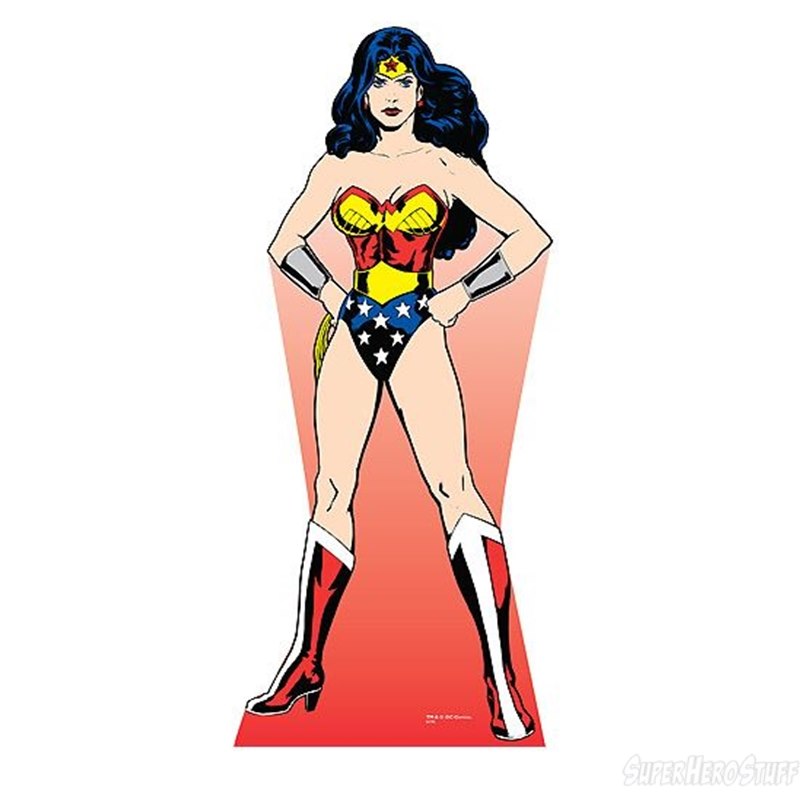At age 10, my son asked me to name my favorite superhero. I told him without hesitation, Wonder Woman. He wanted to know why, which of course in his universe meant “What power makes you like her the most?” I gave him the answer he wanted (bullet deflection) but also the answer he had no life experience to fathom: Wonder Woman had the power to let me know I could do anything in a world that often told girls they were second rate.
At age eight, I was riveted by the 1970s TV show version of Wonder Woman starring Lynda Carter. I loved those bullet deflecting bracelets and her firm stance, feet planted, hands on hips. The way she saved government agent Steve Trevor from a world of trouble. I was floored that Dianna came from an island that was a woman’s world. In my world, I noticed that boys got better sports opportunities, more adventurous camping and scouting experiences, and were taken more seriously in class. With my short haircut, I was often mistaken for a boy and let it pass if it got me where I wanted. I ran through the woods barefoot, climbed cliffs, wrestled boys and I won.
My aunt told me if I kissed my elbow I could become a boy. I tried that, but sadly I had very long arms. My mom embraced my tomboy and Wonder Woman dual status although she had a few qualms about Wonder Woman’s “bathing suit.” I never noticed the suit.
My son was the first to alert me about a year ago that a new Wonder Woman was on her way. As the movie rolls out across America, I’m struck again by how she has moved me throughout my life and clearly countless others — both women and men. Today, as a pastor who specializes in ritual and image to heal wounded souls, I know firsthand the power that images have to heal. So here I am again riveted, this time by the images in my Twitter feed, letting them sink into my psyche and my soul.
Just anticipating the release of this film over the past few months has brought the following images to my mind. The bullets deflected by her bracelets are the toxic words and ideologies that come at any of us. But particularly we women in the current environment now that sexism and white nationalism have been emboldened once again; let loose by our president’s toxic rhetoric and overtly racist policies. The lasso of truth is our effort to counter fake news and immoral policies with facts, the stories of affected people, and a moral vision of who we ought to be.
As I have run from press conference to rally and throw on my clergy gear, I often joke that I am spinning like Lynda Carter and turning into Wonder Woman. Many a woman before standing in front of a crowd have practiced a Wonder Woman stance to claim her authority to speak her truth. I marvel at Gal Gadot’s portrayal of a fierce, warrior woman — strong yet compassionate.
When I entered ministry I had seen a handful of women preach; most people had seen none. My generation of leaders searched for role models and pondered what theological strength in a woman’s body and voice should look like. Our voices, our theological understandings, our bodies and clothes were often critiqued and even ridiculed by a “world of men,” but it was a community of women that helped fortify me for the journey ahead.
In fact, it was quite literally Wonder Woman who helped lead me to a community of women after a difficult period of my life when a person I briefly dated stalked me during seminary, forcing me to move to a new room on campus for safety and rebuild parts of my life. Walking (fearfully) through my new dormitory, I heard the old Wonder Woman theme song and found a fellow seminarian watching the 1970 reruns. Needless to say we became fast friends, developed a pack of Amazon women who had each other’s backs, and went into ministry together, tackling domestic violence, feminist theologies, and LGBTQ rights to this day.
As this newest version of Wonder Woman hits the theaters, it is clearly more than just another film. Stories have the power to transform and strengthen individuals, communities, and movements — and build strength for the cultural and spiritual revolutions we must face.

